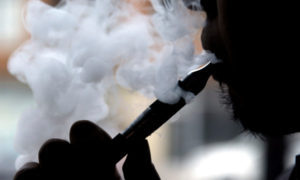
Carolyn Kaster, AP
President Donald Trump gives the thumbs-up as he walks to board Marine One on the South Lawn of the White House in Washington, Tuesday, April 18, 2017, for the short trip to Andrews Air Force Base, Md., en route to Snap-On Tools in Kenosha, Wis. (AP Photo/Carolyn Kaster)

Proponents of electronic cigarettes applauded the recent dismissal of former Surgeon General Vivek Murthy and hope his replacement will be more accepting of the tobacco-alternative practice called vaping.
Murthy, a Harvard-educated physician appointed by former President Barack Obama, was an outspoken critic of e-cigarettes during his 28-month term. The nurse installed as his temporary replacement was Murthy's deputy, but it’s not yet clear if Rear Adm. Sylvia Trent-Adams shares her former boss's opinion that e-cigarettes are a public health threat — or, for that matter, if she will remain in the post.
President Donald Trump has said he intends to slash government regulations, delighting champions of the e-cigarette industry, which could be strangled out of existence by federal oversight.
Laws that went into effect in April 2016 gave the Food and Drug Administration authority to approve all e-cigarette products available since 2007, and they prohibit stores from selling or giving samples of e-cigarettes to people under 18. The new measures also required manufacturers to apply to the FDA for product approval, but gave them a window of two or three years to keep selling the products while under FDA review.
Trump's win, however, gave the industry hope. Writing in Reason magazine, Eric Boehm said existing regulations could "effectively wipe out large swaths of the vaping industry" and that the administration could and should change the laws.
But it's not just the choice of the surgeon general, but also that of the FDA chief, that signals where vaping is headed under the Trump administration. The FDA nominee, Scott Gottlieb, used to be a board member of Kure, a franchise of vaping lounges. Gottlieb survived a Senate committee vote Thursday, and the nomination must now pass the full Senate.
The president himself says he has never smoked or consumed alcohol, leading The Daily Caller to say he's likely the first drug-free president in 24 years. But Trump's determination to free industry from excessive regulation makes it likely that vaping manufacturers and sellers will thrive under his administration. And what will that mean for the health of American families?
What's the harm?
“Harm reduction” is a public health strategy that, to some, lacks ambition. It posits that some bad things we will always have with us — smoking, drugs, alcohol and other risky behavior — and instead of trying to stamp them out, focuses on how to lessen their harm.
Enter electronic cigarettes.
BrandView

Introduced in 2004, the e-cigarette is but one of a group of products known as electronic nicotine delivery systems, or ENDS. (Others include vaporizers, vape pens and e-pipes.) Some look like cigarettes or cigars; others, like writing instruments. Battery-powered, they all deliver nicotine to the user through a liquid that is heated and inhaled, and the liquid is often flavored. On one online retailer's website, the flavors include caramel, Candy King Swedish, Yummy Gum and strawberry banana milkshake.
Despite the candy-coated marketing, the FDA brands nicotine "an addictive chemical," which is why these products must bear a warning to that effect, beginning in 2018.
But proponents of e-cigarettes say that they're an effective way for people addicted to tobacco to wean themselves from cigarettes, and as such, are a method of harm reduction. Cigarettes are so addictive that only 4 to 7 percent of smokers are able to quit without using medication or getting nicotine some other way, the American Cancer Society says.
A rapidly growing pile of research on e-cigarettes has disparate results, and there's more yet to come: The website clinicaltrials.gov lists 147 ongoing or recently concluded studies on e-cigarettes. A commonly heard dictum is that e-cigarettes are 95 percent safer than regular cigarettes, but as Dr. Avrum Spira of Boston University has asked, "The question is: does safer mean safe?”
Health officials in the U.K. have concluded they're safe enough to recommend, but their counterparts in the U.S. are not convinced.
"Nicotine is a highly addictive substance, and many of today’s youth who are using e-cigarettes could become tomorrow’s cigarette smokers. Nicotine exposure can also harm brain development in ways that may affect the health and mental health of our kids," wrote Dr. Thomas Frieden, then director of the Centers for Disease Control and Prevention in the surgeon general's report on e-cigarette use among youths and and young adults, released in December.
In fact, e-cigarette use is higher among high-school students than adults, the report said. Sixteen percent of high-schoolers reported using an e-cigarette in the past 30 days, as compared to 13.6 percent of adults 18 to 24 and 5.7 percent of adults 25 or older. In addition, 5.3 percent of middle-schoolers said they had used an e-cigarette.
The surgeon general's report acknowledged that e-cigarette vapors contain fewer toxins than tobacco products, but said that in addition to nicotine, users are exposed to several other potentially hazardous compounds. "The health effects and potentially harmful doses of heated and aerosolized constituents of e-cigarette liquids, including solvents, flavorants, and toxicants, are not completely understood," the report said.
In addition, e-cigarettes have been known to explode; in one recent case, an Idaho man said he was burned and lost seven teeth when an e-cigarette exploded mid-vape; in another, a New York man's pants caught fire when an e-cigarette combusted in his pocket. Most malfunctions are blamed on the device's batteries; extreme temperatures can cause them to fail, NBC News reported, as can contact with metal like loose change, or overcharging.
"The electrolyte inside the battery is basically the equivalent of gasoline. So when these batteries short out, there's a surge of heat that causes this flammable electrolyte to combust and explode," Venkat Viswanathan, an assistant professor of mechanical engineering at Carnegie Mellon University in Pittsburgh, told Herb Weisbaum of NBC News.
Harm reduction or harm?
Overwhelming evidence about tobacco's health dangers have quieted the chorus of free market champions that defended its use as a consumer's choice. According to the CDC, smoking is the leading cause of preventable death and disease in the U.S., and smoking rates have declined from nearly 21 percent in 2005 to about 15 percent in 2015, statistics that the vaping industry likes to point out.
An e-cigarette company called Vapourlites recently touted an analysis it compiled on smoking rates among the states; it found Utah's to be the lowest at 9.1 percent; Kentucky's, the highest at 25.9 percent. The company attributes the decline to factors that include cigarette taxes, state spending on tobacco prevention and, not surprisingly, the availability of electronic cigarettes.
People who are against e-cigarettes believe that public opinion will turn against vaping as research on the practice accumulates. But for now, a number of conservative and libertarian think tanks are saying hands-off the industry.
In a brief issued in February, The Heritage Foundation argued that e-cigarettes are a form of harm reduction, and by enacting restrictive legislation "the federal government is blocking products and much-needed innovation that could help save the lives of Americans."
The Heartland Institute, an Illinois nonprofit, also maintains that harm reduction justifies e-cigarettes' use. In a report on vaping released in February, the institute rejects the idea that America's 39 million smokers need to "quit or die" and calls for a more compassionate public policy that embraces nicotine-alternatives as a means to quit smoking.
"Policymakers genuinely interested in the welfare of smokers should avoid policies that punish smokers for switching to e-cigarettes and other vapor products. Tobacco harm reduction is compassionate, ethical, and successful," the report said.
Regardless of what think-tanks or researchers say, the e-cigarette industry is more interested in what one particular nonsmoker says.
"We're going to be cutting regulation massively," Trump told a group of business leaders shortly after he was inaugurated.
Whether the 2016 restrictions on e-cigarettes survive depends on how successful the president is, both with his ambitious goal of cutting regulations by 75 percent, and his choice of a surgeon general and FDA chief. For now, however, the industry is smiling. As a headline writer at The Detroit News opined, "President Trump just might save vaping."
TWITTER: @grahamtoday
Click here to view original web page at www.deseretnews.com




















